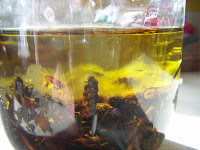Allow me, please, to open with a small rant -
You'd
think I would be pleased to hear that stinging nettles are now commercially available at farmers' markets and even some 'foodie' outlets and yeah, it is 'great', in a way.
But deep down, I'm kinda saddened to hear it.
Here's why:
The true nourishment of nettles, their Medicine, their meaning in the grander scheme of things, is to be found in the gathering.
It's in the hunt.
It's in the way the heartbeat quickens just a little when we discern just the right shade of green (with a blush of red or purple when they're really young) nestled amongst the golds and browns of the old grasses of last year. It's in the pink cheeks from the biting wind and spitting rain of a spring day, and the squelch of the still wet ground we likely have to cross to get to where nettles are wont to be the most plentiful. The best nettles, in my neck of the woods at least, always seem to be the least accessible ones.
It's in the first stings that bring cold benumbed fingers back to fiery life.
It's in their wildness, their downright orneriness. That orneriness is matched by our own as we're so willing, eager even, to set comfort aside just for a taste of something so
genuinely fresh after a winter of imported food.
That's nettles.
But nettles aren't (alas) that for everyone, for some they're just a novel - and very, very nutritious -vegetable that can be a little daunting to deal with in the kitchen. It's not yet nettle season where I live - it's a good month away yet - but I've already heard from folks in warmer climes that they've got themselves a bag or two from the market and they don't quite know how to deal with them. Can I help? Sure, I'll be glad to.
Now that my little rant is (mostly, but I'm not guaranteeing completely) out of the way, read on for how I've learned to prep and cook nettles.



